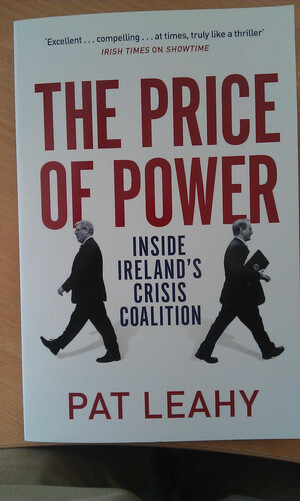From top: The PSC card; Minister for Employment Affairs and Social Protection Regina O’Doherty (left) and Helen Dixon, Data Protection Commissioner
This afternoon.
On RTÉ’s News at One, Pat Leahy, of The Irish Times, spoke to Christopher McEvitt about his article concerning the Government’s decision appeal the Data Protection Commissioner’s report on the Public Services Card.
It comes ahead of a Cabinet meeting this afternoon whereby it’s expected that ministers will be briefed about this decision.
Christopher McEvitt: “Tell us a little bit about the sense of embarrassment felt by the minister in charge of this project, Regina Doherty?”
Pat Leahy: “Yeah, Government have been very quiet about this. Albeit that the report was issued during August – the full report, by the way, hasn’t been published, merely the announcement of the report by the Data Protection Commissioner.
“But there was calls for Regina Doherty, who’s the Minister for Social Protection, who had promoted and defended the use of the card during her period as minister, calls from the Opposition for her to resign, came under a lot of criticism, not just from Opposition politicians, but also from activists in the field.”
“She’s said very little about it since then now and frankly I suppose some of that period was during the traditional political holidays, during August. But we haven’t heard from her in any great detail about the Government’s response to it. But today we find that she is bringing a memo to Cabinet which will inform that Government intends to appeal this, or to challenge the findings of the Commissioner’s report in the High Court.”
McEvitt: “And presumably she has found good reason to appeal the Data Protection Commissioner’s findings on the Public Services Card, we have no idea, have we, as to what the legal argument would be?”
Leahy: “No we don’t have any sight of the detail of the Attorney General’s advice on it, but I’m told what ministers will be briefed on this afternoon, when they meet for the first Cabinet meeting since the August break, is that advice has been taken not just from the Attorney General’s Office but also from an external counsel engaged by the Attorney General’s Office.
“And the advice is that the decision of the, or the findings of the Data Protection Commissioner, in relation to the Public Services Card, were wrong in law, that she exceeded her legal powers and that they are likely to be set aside by a court.
“So I think the next stage that will be taken will be that the Data Protection Commissioner will be informed of this and if her report is not withdrawn that then, which I suppose is unlikely to happen, that High Court proceedings will be issued.”
McEvitt: “Any response thus far to your story on the front page of The Irish Times today from those civil liberties groups, those rights campaigners who were very concerned and who, indeed, welcomed the Data Protection Commissioner’s decision or findings on the Public Services Card, i.e. that it was being used beyond its scope unlawfully, by the Government?”
Leahy: “Well, I suppose campaigners who had been saying these sorts of things about the extension of the use of the Public Services Card for some times felt vindicated by the Data Protection Commissioner’s report and many of them pointing out that this could spawn a series of legal actions against the Government.
“I suppose many of them will not be surprised by the Government’s decision to challenge he findings of the Data Protection Commissioner. I suppose at a basic, political, level, it kicks the issue into touch.
“I think there will likely be criticism by both the Opposition and activists on the Government’s decision but from the point of view of Government Buildings, once that criticism is out of the way and I suppose once this story has died down, then it means it’s not something that has to be immediately addressed by the Government until such time the legal action has resolved itself which, as we know, is not something, that generally happens very quickly.”
Listen back in full here
Earlier: ‘They’ve Been Collecting Data About Voters For A Very Long Time’






